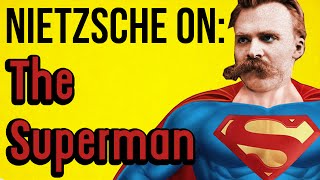The concept of the Superman is one of the strangest, most fascinating ideas in Philosophy.
作为哲学领域里最奇怪、也是最吸引人的想法之一,“超人哲学”的概念
We find it coined by Friedrich Nietzsche in his book of 1883: Thus Spoke Zarathustra.
最初是弗雷德里希·尼采在他出版于1883年的一本书《查拉图斯特拉如是说》中提出的。
On first hearing it, we can't help but think of the action hero Superman, described by his creators as "faster than a speeding bullet",
第一次听到“超人哲学”,我们难免会联想到一些“超级英雄”的行为——那些行为,用他们的创造者的话来说,就是“跑得比出膛的子弹还快”,
more powerful than a locomotive, and "able to leap tall buildings in a single bound". These are actually very good starting points.
“拥有比机车还强的动力”,还有“可以一下跃过一座大楼” 这些倒是很好的切入点。
DC Comics were asking themselves what someone would be like who is physically far superior to all current human beings.
美国DC漫画公司一直在问这样一个问题:如果一个人的身体素质强于其他所有人类的话,那个人会是什么样子?
Nietzsche is asking himself a very similar question; only, he's interested in psychological qualities.
尼采也提出了一个十分相似的问题,只不过,他的关注点在心理而不在生理上。
In Thus Spoke Zarathustra, Nietzsche points out that evolution cannot be assumed to have finished.
在《查拉图斯特拉如是说》中,尼采指出:人类的进化还没有结束。(即人类还能进化出超越自己的东西——“超人”)
Human beings have evolved from apes, but, what is ape to man? He asks.
猿进化成人,那么,尼采问道:猿对于人来说是什么呢?
In some respects, like imagination and science, we are obviously far superior to our ancestors.
从一些角度来看,比如想象力和科学,我们远比过去的祖先们要先进。
So how might people of the future be superior to who we are today?
所以未来的人类会不会比现在的我们更优越呢?
Nietzsche's character, Zarathustra's, task is to speculate about what the superman - the more advanced person of tomorrow - will be like.
《查拉图斯特拉如是说》书中的角色查拉图斯特拉,他的主要任务就是去思考,超人——更优秀的人类物种——会是怎样的
Nietzsche wasn't interested in massively enhanced brain power, an ability to do hugely complex sums in one's head, or to learn a language in three days.
尼采对那种能在脑内进行复杂运算,或者三天学会一门语言的强大脑力不感兴趣。
Rather, he was developing a crucial thought experiment: Suppose we were psychologically superior to people of today, what would we actually be like?
他认为更重要的是人的思想。如果我们在思想上超越了当下的人类,我们究竟会是什么样子?
What is the ideal kind of human being? And he came up with a very surprising and challenging answer -
到底什么是最优的人类?他得出了一个令人惊奇又费解的答案——
Nietzsche's strategy for answering his own question was to identify the person he most admired,
当然为了解答他自己提出的问题,尼采研究了他最崇拜的人,
the person he thought had the best approach to life, and then hone in on the qualities that made this person the way they were.
也是他认为拥有最好生活方法的人。他仔细研究了那些人的特质。

He was particularly impressed by Johann Wolfgang von Goethe whom he regarded as the nearest anyone had yet come to being a superman.
其中就有尼采十分欣赏的约翰·沃尔夫冈·冯·歌德。那是尼采认为最接近“超人”的人。
He also took some hints from Napoleon, Montaigne, Voltaire, and Julius Cesar.
他还从拿破仑、蒙田、伏尔泰和尤里乌斯·凯撒等到了些启示。
He concluded that Supermen are going to have some wonderful and sometimes unexpected characteristics.
最后,他的结论是超人拥有一些优秀的、有时也意料之外的品质:
They will: make their own values; they will be very independently minded;
他们创造自己的价值;他们有独立的思想;
they won't ask "what do other people admire?" and follow along -they will carve their own path.
不会问“别人崇尚的是什么”然后随大流;他们开创自己的道路。
Supermen accept that might need to hurt people in the name of great things. They can be selfish in strategic ways.
“超人”们也会为了重要的事情伤害其他人,他们为了取胜也是自私的。
Greatness for them will be about the reform of the humanity towards pagan values -- the values of Goethe.
他们的“伟大”之处在于,他们将人性重塑到“异教徒”的价值观——歌德的价值观
Supermen will never be resentful of the success of others; they will accept suffering as a necessary component of good things.
“超人”不会因他人的成功感到气恼,他们认同苦难是美好事情中的一个组成部分
They will understand that they're hard to understand, and therefore, they may often be lonely.
他们明白自己难以令人参透 所以他们常常是孤独的,
They will be gentle to towards the weak, out of consciousness of their own great strength.
他们对弱小的人很温和,并且意识的到他们强大的力量。
They will be a little bit wicked around sex by conventional standards.
在常规的标准下,他们在性的方面显得有些邪恶
They will not be humble, but rather, delight in their own abilities.
他们不会谦虚,正相反,他们自足于自己的能力。
They will be interested in the practical application of culture to raise the mentality of society.
他们对可以提升社会心理的文化实践很感兴趣。
Nietzsche thought we would be surprised and sometimes a bit shocked by his list.
尼采觉得人们可能会被这些品质惊讶到
He thought we would be expecting that the super humans of tomorrow would be deeply compassionate,
因为这些并非是我们想象中的未来的超人——那个拥有同情心、
very egalitarian, uninterested in rivalry, and perhaps have ambitions to make breakthroughs in science.
主张平等的、远离战争,也许还有为科学做贡献的形象。
But Nietzsche was arguing something else: that maybe being great involve some qualities that were a bit disturbing;
但这些都不是尼采所说的“超人” 尼采的“超人”拥有的品质有一些不一样,
and also, that greatness means being interested in the salvation of mankind through culture.
还有,他们关心文化中人类的救赎。
The word superman is useful for getting us to think about who we would like to evolve into.
“超人”这个词倒是帮助我们思考 到底我们会进化成怎样的人?
Each of us should, under Nietzsche's guidance, have a sense of what we would like to be if we could be the super version of ourselves.
在尼采的引导之下,我们对超越了自己之后会变成的样子有了一定的概念。
The idea of the Superman helps us to refine our own ambitions.
“超人”的概念帮助我们完善我们的远大志向











